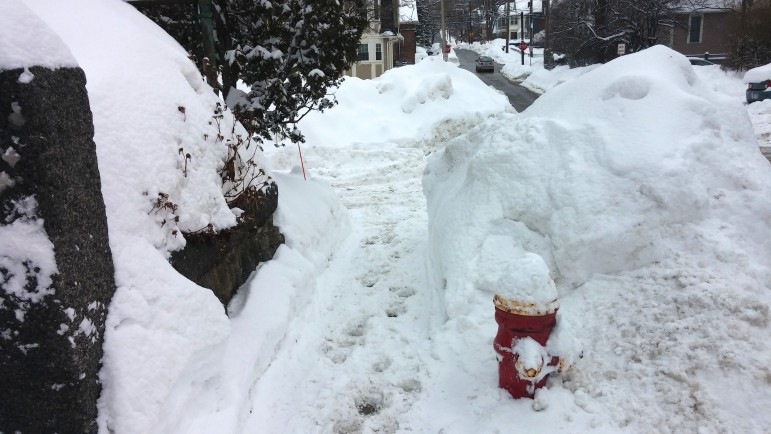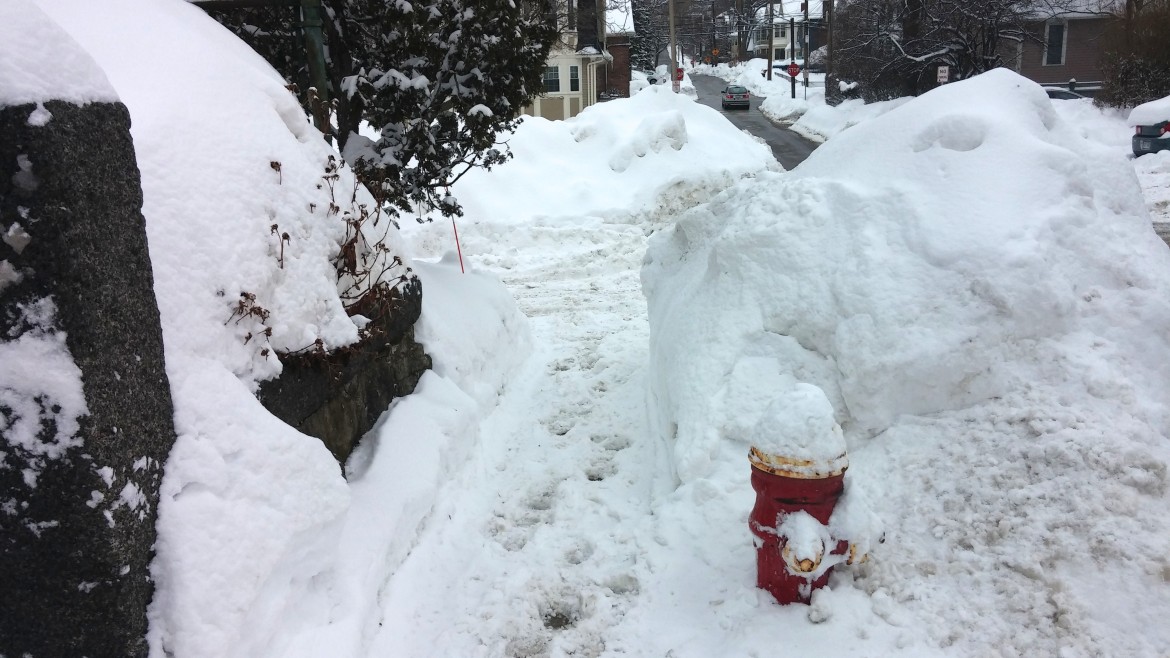
Charlie Breitrose
A cleared walking path in Watertown ends abruptly because a neighboring property has not cleared its sidewalk.
This winter’s heavy snows left many Watertown residents fed up with not being able to walk sidewalks covered with feet of snow, and many came out to support having an ordinance to require residents to clear snow off their sidewalks.
The Town Council’s Public Works subcommittee discussed a possible residential snow shoveling requirement Wednesday night. After hearing from a largely pro-requirement set of residents they approved supporting a residential snow ordinance and sent it on for more study.
The town already has a commercial snow shoveling requirement, and this is not the first attempt at adding a residential one. In 2012 a proposed ordinance made it to the full Council, but it was soundly defeated, recalled Council Vice President Steve Corbett, who supported it then and still wants to have a residential requirement.
Bevin Croft said she did not feel safe walking with her son around her neighborhood during the snowy months this year, and prior years have been almost as bad.
“I did not leave the house with my son unless we were in a car,” Croft said. “We have only one car in our household, and I think about people who live in Watertown without a car.”
Parent Jeannette Belcher-Schepis works with Community Safe Routes to School. She said sidewalks need to be cleared not just around schools but everywhere in town, because students live all over town. (See the group’s survey here)
“Students need to be able to walk to school safely,” Belcher-Schepis said.
This year, Belcher-Schepis said, some students had to walk in the street to avoid of snow-covered sidewalks.
“We had some reports of kids being hit by cars,” Belcher Schepis said.
By having an ordinance, said resident Ethan Davis, the town would spell out what is expected of people.
“We can figure out a way to help people who are not able to shovel,” Davis said. “It is an opportunity for the community to come together.”
A program to match Watertown Middle School students with seniors who cannot shovel their walk was started with the help of Councilor Ken Woodland. The effort, called Watertown Prosperity, was in its first year this winter and Woodland said he hopes to expand it.
Not everyone likes the idea of a residential shoveling requirement. Ralph Filicchia said he lives on a quiet street, and he wanted to see his area given an exception from the requirement.
“I live on Bellevue, it is more of a residential area,” Filicchia said. “Leave us alone. We’re fine walking in the street.”
Russ Arico has opposed the residential requirement each time it comes up. He said he does not want the town to be a “nanny” by telling residents what to do with ordinances.
“We should produce a sidewalk non-walkable website and publish photos and the names of owners who do not shovel their sidewalk,” Arico said. “Let’s make it social unacceptable.”
He also does not want police to use their time checking whether sidewalks are clear of snow.
Some said they like the idea of a requirement, but oppose having a time limit after a storm by which residents must remove snow.
“Anything you pass that gives a time limit, we will ignore,” said Burt Greenberg, speaking on behalf of The Village Condominiums.
Others worried about having to have a cleared sidewalk when a snow plow could come along and dump feet of snow on the sidewalk, or more often, at the end of a driveway, blocking the sidewalk on both sides.
Ilana Mainelli said she thinks people are looking at it the wrong way.
“People talk about people around them making it more difficult for them to shovel the sidewalk,” Mainelli said. “They are twisting it around. The whole point is to put something into place to require sidewalks be cleared.”
Resident Elodia Thomas suggested looking at other solutions. Other communities have take other steps, such as Ann Arbor, Mich., which has a program called SnowBuddy where a group bought a sidewalk plow and plows sidewalks in the area. Or, she said, Rochester, N.Y., which charges by the linear foot to plow residents’ sidewalks.
The subcommittee voted 3-0 to support the residential shoveling ordinance and have the ordinance taken up by the both the Public Works and Budget and Fiscal Oversight subcommittees to discuss how make sure the ordinance is enforced and ways to handle hardship cases, where people who cannot physically shovel their walks.

The necessity of snow removal applies to all. Not just residents, but businesses and government agencies as well. DCR always does a poor job of snow removal on Charles River Road. This winter they did not remove a flake of snow from the Community Path from Arlington Street to School Street. It was entirely unpassable. This is wrong and should be treated with as much seriousness as residents not removing snow.
The fact is the sidewalks belong to the town, not the homeowner. What gives the town the right to force homeowners to provide them with free labor to take care of the town’s snow on the town’s sidewalk??
I’ve always seen that towns sidewalk in front my residence is clear. We pay a plow to do our driveway, we pay extra to pay for what is actually the town’s responsibility. This proposal is Slavery by the very definition of word. And it’s so hypocritical of some counselors who constantly voice their concern for the civil liberty of the left wing special interest groups they belong to, but they when it comes to violating the 13th Amendment, in this case… the could careless.
Slavery? The 13th Amendment? This would be a stretch to be sure. Thousands of towns across the country have a snow clearance ordinance, in fact it is the norm, not the exception. These ordinances are based on the principle that we all use the sidewalks, and that for the better good of all, we clear the snow in front of out houses so that we can all get around. It is a basic act of community and has nothing to do with slavery.